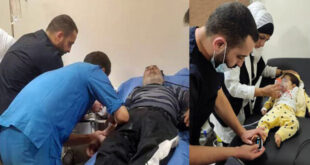Damascus, SANA-Minister of Awqaf (Religious Endowments) Mohammad Abdul-Sattar al-Sayyed said the new standard version of Quran was not meant to be a new Quran rather a firsthand fully checked representation of the Holy Quran in accordance with the original copy made by the Venerable Caliph Uthman Ibn Affan, may Allah be pleased with him.
However, this doesn’t mean that the former editions of the Holy Quran are incorrect or inappropriate. This work is a kind of improvement in the function of Qu’ranic script, locations of beginnings and ends of Qur’anic sentences, and standardization of the letters of Quranic words. The purpose is to produce a standardized edition for publishers and publishing centers to adopt with no alternation or change in the original Quranic script.
This enables Muslims, irrespective of their educational backgrounds, to read the Qur’anic script with no difficulties resulting from the size, dotting or vowelization of letters.
This great work has been accomplished by a committee of the greatest Qur’anic reciters and specialists in Qur’anic sciences, whose names shall be recited at the end of this memorandum.
In the name of Allah, the Most Gracious, the Most Merciful
The Standardized edition of the Holy Qur’an
(A system of accuracy in vowelization and clarity of script)
Praise be to Allah, Lord of all worlds, and blessings and peace of Allah be upon our master Muhammad and upon his family and companions.
On the basis of duty of responsibility and care for the service of Allah’s Book, and after having revised all of the different editions of the Holy Qur’an published in the Islamic countries, the Quran revision and control committee of the Ministry of Endowments has published this distinguished edition of the Holy Qur’an. This was done under the supervision of the Permanent committee of the Holy Qur’an Affairs in the Syrian Arab Republic.
Upon checking a lot of Qur’anic editions, the Qur’an Revision and Control Committee has found out that the letters of some of them and the locations of dotting and vowelization marks are problematic and ambiguous for ordinary, non-specialized readers, which contradicts the purpose of publishing such editions, i.e. facilitating reading of the Holy Quran and avoiding erroneous reading.
On several occasions, the committee asked the publishers to remove such ambiguities, but they failed to do so under the pretext of hardship and unavailability of the required technical equipment.
Therefore, the committee presented a suggestion to his Excellency Minister of Endowments to make amendments to al-Mousshaf al-Sharif, which was written at the time of late President, Hafiz al-Assad ( may Allah have mercy on him), and whose rights are owned by the Ministry of Endowments of the Syrian Arab Republic.
Upon general directives by Mr. President Bashar al-Assad as regards care for the Holy Qur’an, from the viewpoint of understanding, learning, interpretation and publication, the Minister of Endowments has had the honor to inaugurate work on the computerized amendment of that edition so that it becomes the standard Edition to be adopted by those who desire to duly serve Allah’s Book, with priority given to academic aspects over technical ones, so that the script becomes a servant of the Holy Quran and not vice versa.
This edition is historically and scientifically important due to the following facts:
First: Historical significance:
1-It is the first Mousshaf written in Uthmani script and whose pages end with a full verse, which is called “Mousshaf al-Houffaz,” which was adopted in all of the Islamic countries.
2-It is the first Musshaf that calligrapher Uthman Taha has had the honor to write, before the one he wrote in 1977 ( which is called al-Dar al-Shamieh Edition ), and which was adopted by al-Madina al-Nabawiyah Complex for the publication of the Holy Quran in 1984; and Syria, with its scholars and Qur’anic reciters, has lawys been the center and zenith of science.
3-It was written specially for the Syrian Ministry of Endowments, which provides licenses for the publication of similar editions.
Second: The scientific and technical regulations adopted in the amendment:
The committee has set certain regulations for the amendment, and the basis it has adopted is : (Application of the system adopted throughout the entire Mousshaf ) according to the following regulations:
A-Concerning dots and letters:
1.Preventing overriding of letters,
2.Writing the middle (ha’) letters in the form of knots,
3.Placing dots right over their letters’
4.The (Ta’) and (Ya’) dots are placed horizontally, not vertically, all over the Mousshaf.
B-Concerning coding marks:
1.Placing the (Ha’) right over its proper location,
2.Placing the small (Alif) right over its proper location,
3.Placing the connected (ha’) small marks on, not under, the line,
4.placing vowelization marks right over their letters, and maintaining the same size and boldness for all of them,
5.placing vowelization marks right over, or right under, the dotted letters,
6.Amednment of the form of consecutive accusative case nunnations to avoid ambiguity,
7.placing prolongation marks right over their letters,
8.The vowelization marks for the (Ta’) and (Tha’) right before their letters,
9.Distinction between the round and square silence marks.
C-complementaries adopted by the committee:
1.Not placing articles of negation, interdiction, or exception at the end of the line,
2.Not placing end-of-verse marks at the beginning of lines,
- Not curving the top of (al-Alif al-Mamdoudah).
And the conclusion of our invocation is:
Praise be to Allah, Lord of all worlds.
The permanent committee for the Holy Quran Affairs
Al-Hafiz and Jami’ Dr. Anas al-Dawamneh
Al-Hafiz and Jami’ Dr.Rif’at Ali Deeb
Al-Hafiz and Jami’ Sheikh Ihsan al-Sayid Hassan
Al-Hafiz and Jami’ Sheikh Abdul Mon’im al-Shalati
Al-Hafiz and Jami’ Sheikh Muhammad Na’im Urqsousi
Al-Hafiz and Jami’ Sheikh Yahia al-Nassih
Al-Hafiz and Jami’ Dr. Khalid al-Ulabi
Dr. Khudur Shahrour
Dr. Badi’ Syed al-Lahham
Dr. Muhammad Sharif al-sawaf
Sheikh Haitham al-Idelbi
Sheikh Imad al-Habboul
Mazen
 Syrian Arab News Agency S A N A
Syrian Arab News Agency S A N A

